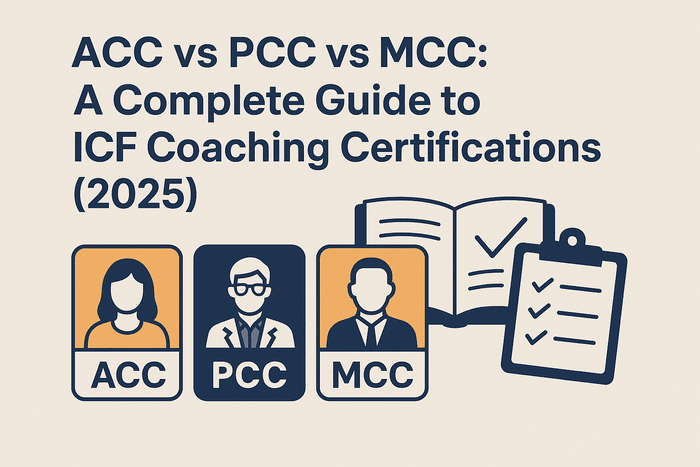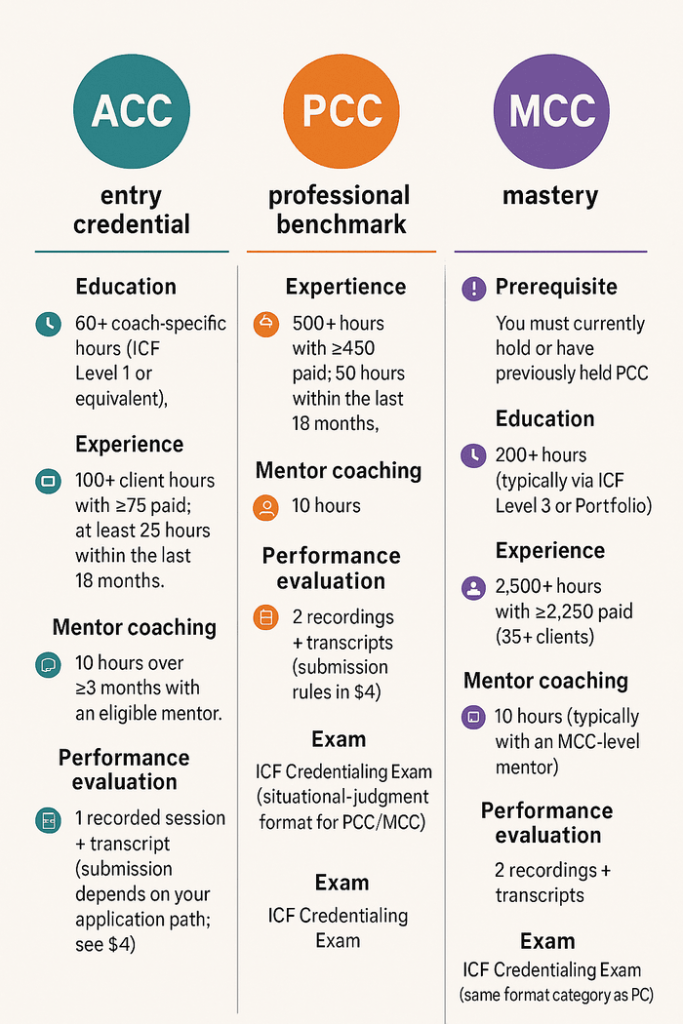
Effective strategic planning and stakeholder management are essential skills for leaders in a rapidly changing business environment. Strategic planning provides...
ACC is the entry-level ICF credential for new coaches: 60+ education hours, 100+ coaching hours (75 paid), 10 hours mentor coaching, 1 performance recording, exam. PCC is the professional standard for experienced coaches: 125+ education hours, 500+ hours (450 paid), 10 hours mentor coaching, 2 recordings, exam. MCC is the pinnacle: 200+ education hours, 2,500+ hours (2,250 paid), current/previous PCC, 10 hours mentor coaching, 2 recordings, exam. ICF’s Level 1 → ACC, Level 2 → PCC, Level 3 → MCC education structure replaced legacy ACTP/ACSTH pathways and maps cleanly to each credential. This article is built using a current SEO framework for search intent alignment, skimmable structure, E‑E‑A‑T signals, FAQ schema, and helpful UX patterns so it can win snippets and satisfy readers.

| Requirement | ACC | PCC | MCC |
| Coach‑specific education | 60+ hours | 125+ hours | 200+ hours |
| Coaching experience | 100+ hours (≥ 75 paid) | 500+ (≥ 450 paid) | 2,500+ (≥ 2,250 paid) |
| Mentor coaching | 10 hours | 10 hours | 10 hours |
| Performance eval (recordings) | 1 | 2 | 2 |
| Exam | ACC Exam | ICF Credentialing Exam | ICF Credentialing Exam |
| Education level map | Level 1 → ACC | Level 2 → PCC | Level 3 → MCC |
Sources: ICF eligibility guides and experience requirements; Level mapping on ICF “How to Become a Coach.”
Hours only count after you start coach‑specific education (defined by ICF as a course of ≥30 hours, with ≥24 hours on Core Competencies).

All ACC, PCC, and MCC candidates must pass a performance evaluation. However, not everyone submits recordings to ICF:
ICF announced and documents ongoing exam updates and logistics on its credentialing/exam hub.
All ICF credentials renew every 3 years with Continuing Coach Education (CCE). One nuance at the ACC level:
Refer to ICF’s renewal guide if you need the latest process details.
Education map: Level 1 → ACC | Level 2 → PCC | Level 3 → MCC.
8) Application steps & documentation checklist
Step 1 — Pick your path: Complete the short Credential Path Survey, which customizes your application (ACC, PCC, MCC).
Step 2 — Gather evidence:
After weighing the distinctions between ACC, PCC and MCC—such as required training hours, coaching experience and exam formats—the next challenge is finding a program that prepares you for the specific credential you’ve chosen. Programs mapped to ICF Level 1, Level 2 and Level 3 are designed to satisfy the education requirements for ACC, PCC and MCC respectively. As you evaluate providers, consider whether they offer the level you need, and check that their curriculum thoroughly covers ICF competencies, includes sufficient mentor coaching and performance evaluations, and provides flexibility to accommodate your schedule. Look for transparency about faculty credentials and alumni success, as these indicators can signal the program’s quality and support network. To simplify this research, Erickson’s 2026 comparison guide presents side‑by‑side information on India’s leading ICF‑accredited programs, including their level alignment, training hours, mentoring structure and unique features. Consulting this resource will help you match your credential goal with an appropriate program, ensuring you invest in education that sets you up for success.

Effective strategic planning and stakeholder management are essential skills for leaders in a rapidly changing business environment. Strategic planning provides...

Change Management & Digital Transformation: Build Adaptive Leaders with Erickson Coaching Rapid technological advances, shifting customer expectations and global disruption...

Discover how Erickson’s solution‑focused coaching delivers up to 788 % ROI and drives operational excellence by improving strategic thinking, communication and...

The coaching profession has moved from the margins to the mainstream. Recent global studies show that the number of professional...

India’s economy has transformed dramatically over the last decade, and the demand for top business coach India services has grown...

When searching for a certified life coach program price, it’s natural to start by comparing tuition fees. Aspiring coaches want...

Neuro-Linguistic Programming (NLP) is experiencing a resurgence in India. Social media, workshops and high-energy seminars promise instant breakthroughs by rewiring...

Many professionals pursue the title of Certified Organizational Development Coach with the expectation that a credential alone will open corporate...

Some providers offer to fast-track you to PCC status through purely online modules for a fraction of the cost of...